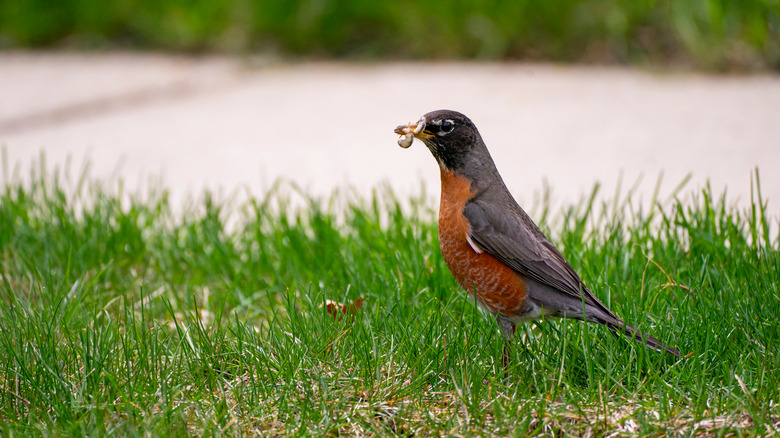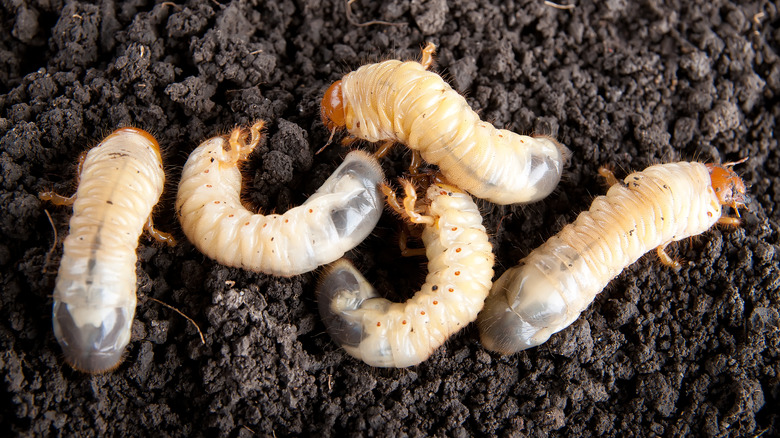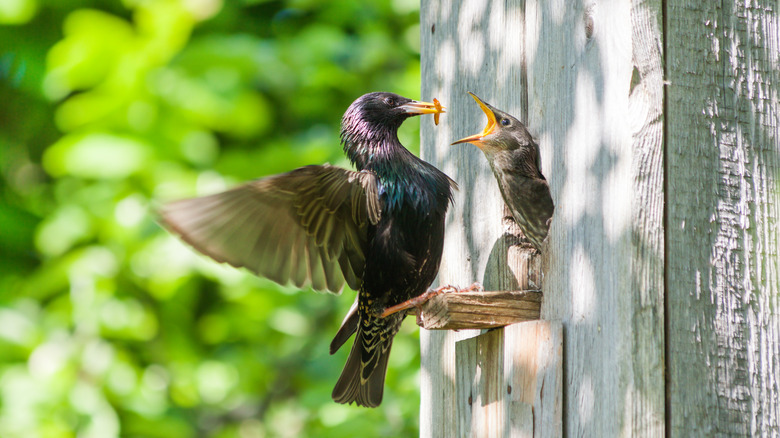Lure Songbirds To Your Yard To Get Rid Of These Pesky Worms
The early bird gets the worm — or, in this case, a grub, which isn't really a worm at all. So, maybe "the early bird gets the grub" is a better phrase. Of course, birds don't care about semantics — they're just happy to have bagged breakfast. And you should be happy for them too. Grub worms can quickly transform your once lush lawn into a withered wasteland. But luring songbirds to your yard can be a great way to keep pesky worms, or rather grubs, in check. Grub worms (also called white grubs) are the larvae of various types of scarab beetles, including June beetles, Japanese beetles, European chafers, and masked chafers. These larvae live in the soil and feed on grass roots, causing the blades to wilt and die.
Small numbers of grubs aren't cause for alarm, but large infestations can lead to brown patches. Depending on the species, grub worms are typically most destructive in late summer when they're growing rapidly and feeding aggressively, but many species also feast in the spring. There are several ways to get rid of grub worms, but enlisting the help of avian allies is an easy and inexpensive way to keep greedy grubs from gorging on your grass. Of course, having a bunch of songbirds pecking at your lawn is bound to leave some holes. But the damage is less devastating than a severe grub worm infestation. Plus, they're providing free aeration, so maybe consider it a favor.
Which songbirds eat grub worms
Many insect-eating birds naturally gobble up grub worms. Robins, one of the most prevalent backyard birds, are known for worm wrangling. In fact, whoever coined the phrase "the early bird gets the worm" may have had robins in mind. You'll often find these early risers fishing for earthworms in the morning hours. Fortunately, white grubs are also on their menu. Perhaps the only birds that eat more grubs than robins are starlings. In fact, large numbers of starlings poking around your yard could be a sign you have a lawn grub problem on your hands. Although these invasive birds are often unwelcome visitors, their unusual jaw musculature makes them excellent exterminators. Unlike most birds, starlings can spring open their jaws, allowing them to pry holes in the soil to uncover grubs and other pests.
While not quite as common as robins and starlings, northern flickers and blue jays keep pesky grub worms under control, too. Unlike other woodpeckers, flickers feed on the ground, probing the soil with their beaks. Ants are their preferred entree, but they also feast on grubs. Blue jays also like grubs, but they also eat adult June beetles and other scarabs, reducing the risk of future grub worm infestations. Other songbirds that sometimes feed on grubs include bluebirds, blackbirds, and grackles.
How you can lure songbirds to your yard
You'll need a tempting food menu, nesting accommodations, water features, and hangout spots to recruit grub-eating songbirds to your yard. Robins, starlings, flickers, and blue jays eat on the ground, so feeding trays and platform feeders work best for them. Robins don't eat seeds, so add fruit to the feeders or plant berry-bearing bushes to catch these birds' attention. Providing birdhouses is another way to encourage birds to make themselves at home. But choosing the best type of birdhouse for your yard depends on the bird species you want to attract. Starlings are cavity nesters, and they will inhabit medium to large birdhouses with openings big enough for them to squeeze through. However, robins and blue jays typically nest in trees, so they require nesting platforms or shelves.
Adding birdbaths makes your yard even more inviting. Shallow baths that mimic puddles work best. Change the water every day or so and place the bath away from thick shrubs so predators can't sneak up on unsuspecting bathers. Birds also need perches and hiding spots, so planting native shrubs and trees around your lawn will make them less likely to leave between meals. By providing these key amenities, you can tempt grub-eaters to take advantage of your lawn's early bird breakfast specials and ensure they stick around for lunch and dinner, too.


